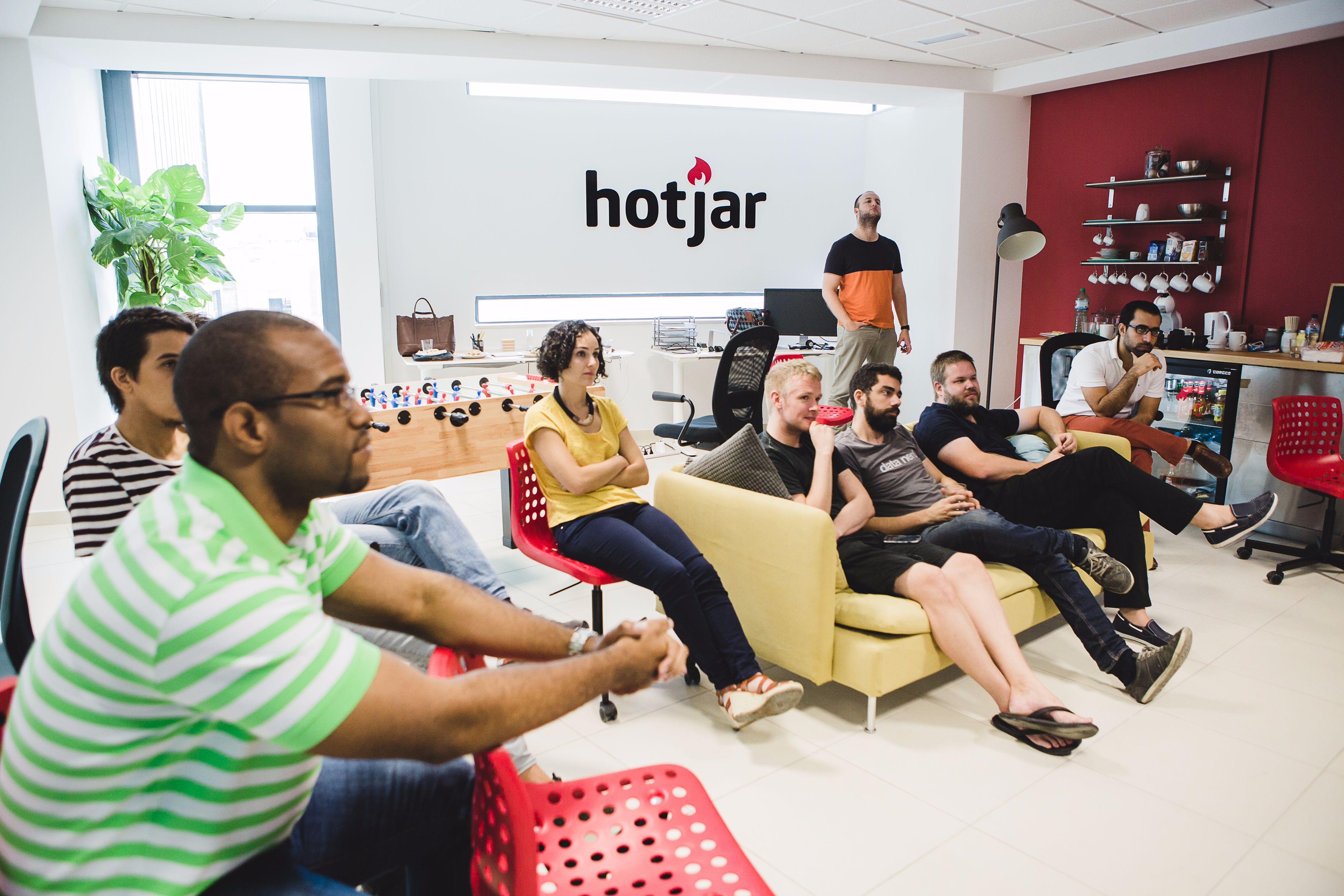In less than three years, David Darmanin’s user research and analytics startup, Hotjar, went from a nine-month beta to a public product with a $9.4 million Annual Recurring Revenue (ARR). The founder credits part of the company’s fast success to the fact that his entire 42 person team works remotely.
"Remote was just the prerequisite," Darmanin explained in a phone interview. “We’ve taken it to the next level, which is: we really believe that people shouldn’t be managed but should be led and shown the way. So where do we want to go and what is our purpose?”
Working remotely became a guiding principle that impacts everything from the way Hotjar manages projects to the company’s budget. They’ve trimmed away top-heavy approval processes to allow each team and individual to be as autonomous as possible, relying instead on a series of weekly discussions, a company-wide strategic plan, and a hefty amount of individual trust and accountability.
"People instinctively want to be trusted," Darmanin explains. “They want to be given challenges and in a position to succeed — and not to be told what to do… We hire amazing people that are self-driven and then we give them the tools and the resources to do amazing things.”
We spoke to Darmanin at length about how he leads a remote team spread across 16 countries. He shared specifics on how Hotjar manages their projects and budget — all guided by his ‘lead, don’t manage’ philosophy.
Note: Hotjar built their $9 million company with a fully remote team of developers. If you’re looking to do something similar, we’ve already vetted thousands of the top 2% of remote developers worldwide. Click here to learn more and chat with us to find a good fit for your project and budget.
Each team relies on the company’s annual strategic initiatives
To keep everyone on the same page, Hotjar uses a one-page strategic document based on the book, Scaling Up: Mastering The Rockefeller Habits 2.0. The document contains the company’s annual initiatives, long term goals, and action steps to get there.
Everyone in the company has access to the document and is asked to align their work to the year’s initiatives. "It’s defining the North Star and trusting the team to make sure that everything we’re working on is in that direction. And if it’s not, we’ll make mistakes, we’ll re-align, and we’ll learn."
Each department has a backlog of projects that align with these initiatives. There’s usually a team lead who sets the team’s priorities and coordinates with the company’s leadership team to ensure that projects don’t conflict. Team members then set their own priorities accordingly.
"There are no rubber stamps. We believe a lot in accountability, so if someone decides on their own to do something, then they’re going to be accountable for it … so they’re going to want to have a healthy discussion before doing something."
Annual meetups at the Hotjar HQ Malta are an important way for team members to get to know each other
Weekly discussions hold employees accountable
These discussions, in the form of individual and team check-ins, are built into the company’s weekly rhythm. From the top down, there’s a company-wide stand-up planning meeting at the beginning of each week and a retrospective at the end. On Friday, they look back at what did and did not go well, evaluate what they need to improve on, and demo the work they’ve completed. Demoing completed work holds each employee accountable to staying productive. "It becomes very very obvious when a team is not executing, and this rhythm doesn’t allow you to be idle."
Where many startups require the official or unofficial approval of the founder, Darmanin’s employees understand they don’t need to wait on him to take action. "They typically include me because they want to get feedback, but more and more as we grow, I’m not a bottleneck. So teams can go ahead and do things and not rely on me completely."
For example, one team recently came to Darmanin after they realized that a product they were using was not scaling the way they wanted it to. They wanted to research another tool, which Darmanin believed made sense. He didn’t hear back from them until they had found a replacement they believed would work better. Darmanin provided feedback, and they quickly closed the deal. The team is now working on building out this other product.
The Hotjar team at one of their annual meetups
How the company manages its budget
At Hotjar, there are no regulations for how a department can allocate its funds.
This approval-light methodology extends to the budget as well. The company reviews its revenue annually, and each department is given a budget based on a percentage of the revenue and manages their budget internally. The better a department does, the bigger their budget becomes, and the more projects they can take on. There are no regulations for how a department can allocate its funds.
"Let’s say you create a system of approval for everything, then you’re going to need people to manage it, and then you need to devise processes and everything. It’s so easy to just follow how things were done before, just for the sake of doing it that way — you don’t realize the operation cost of doing things just because you don’t trust the team."
Darmanin expects them to know what needs to be done and to manage funds appropriately. "For example, server costs," he explained. “The product team manages that, so it’s just part of their job.” This process seems to happen organically with each team. Just like on the project level, someone in each department tends to own the budget and discuss it amongst their team.
Each employee has their own budget, as well. New hires are given a $4,700 home office budget, as well as separate budgets for travel expenses and personal development, all of which get topped off at the end of the year. No personal purchases requires approval — "If you want a book, you just go get it, or if you want to sign up for a course." Employees are given a Hotjar credit card with the necessary balance to cover their budgets, and then use Expensify to keep track of their expenditures.
New hires are given a $4,700 home office budget, as well as separate budgets for travel expenses and personal development.
There is no approval process for taking time off, either. Employees coordinate with their team and note their planned time off in a system.
The operations team is responsible for providing feedback to individuals who are having issues managing their budget or their time off. "If we see a pattern, then we escalate things quite quickly. The thing is, once you have a framework and a model like this which is very much built around trust and empowering people, they need to be able to to have the drive to do that. We haven’t set up a company where we spoon-feed people. If they want to be spoon-fed, then it’s not going to work out."
Can this method scale?
Over the past three years, Darmanin has managed to grow his team while still maintaining an ethos of personal accountability. This is not to say that the company’s culture has been static. When his team grew to twenty, he explained, "We went from a close knit team to a feeling of an organization. We were lucky because we knew it was coming, so we prepared for it early on."
He believes that major inflection points occur when a company reaches 20, 50, and 100 employees, and they've already started preparing for the hundred mark. They’re currently strategizing what positions they’ll need, a hiring schedule, and how to keep the departments balanced. It will be interesting to see how Darmanin and his team continue to self-lead as both the company and its workforce continue to grow.
Note: Hotjar built their $9 million company with a fully remote team of developers. If you’re looking to do something similar, we’ve already vetted thousands of the top 2% of remote developers worldwide. Click here to learn more and chat with us to find a good fit for your project and budget.





